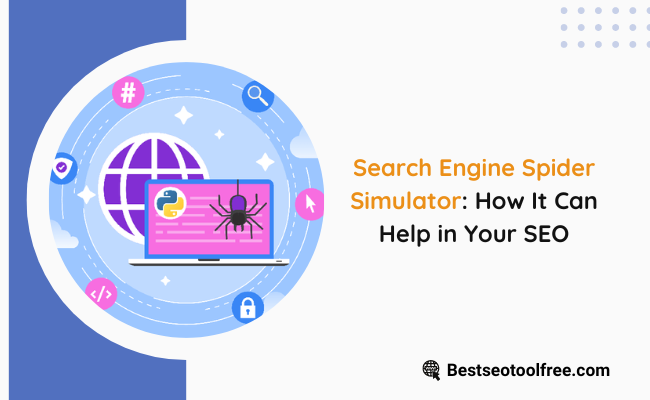Search Engine Optimization (SEO) is an essential element of digital marketing. A well-optimized website can help you rank higher on search engines, which can lead to more traffic and potential customers. However, optimizing your website can be a complex process, and it requires a lot of knowledge and expertise. One of the essential tools in SEO is a Search Engine Spider Simulator. In this blog post, we will discuss what is and how it can help your SEO efforts.
What is a search engine spider simulator?
A search engine spider simulator is a tool that simulates the behavior of search engine crawlers or spiders. Search engine spiders are automated programs that visit websites to collect data and add them to search engine indexes. The spiders follow links from one web page to another, collecting data such as page titles, meta descriptions, and other important information. The search engine then uses this data to rank the website for specific keywords.
A search engine spider simulator works by mimicking the behavior of search engine spiders. It crawls your website and collects data, just like a search engine spider would. The tool then provides you with a detailed report on your website’s crawl ability, highlighting any issues that could affect your search engine rankings.
How can a search engine spider simulator help your SEO efforts?
1. Providing insights into mobile-friendliness
Mobile-friendliness is crucial for SEO. With more and more people using their mobile devices to browse the internet. Search engines prioritize mobile-friendly websites in their search results.
A search engine spider simulator can analyze your website’s mobile-friendliness and provide you with insights into how you can optimize your website for mobile devices. The tool can identify any mobile usabilities issues, such as small font sizes, improperly sized buttons, and slow loading times on mobile devices. Once you identify these issues, you can take steps to fix them and improve your website’s mobile-friendliness.
2. Helping with website structure
Website structure and internal linking are crucial elements of SEO. A well-structured website with a clear hierarchy and effective internal linking can improve your website’s crawl ability and search engine rankings.
A search engine spider simulator can analyze your website’s structure and internal linking and provide you with suggestions on how to improve them. The tool can identify any structural issues, such as pages buried deep within the website’s hierarchy, and suggest ways to improve the structure to make it more search engine-friendly.
3. Identifying crawl ability issues
One of the most significant benefits of using a search engine spider simulator is that it can help you identify crawl ability issues on your website. Crawling is the process by which search engine spiders visit and index your website’s pages. If there are any crawl ability issues on your website, search engine spiders may not be able to index some or all of your pages. This can hurt your website’s rankings.
It can help you identify crawl ability issues on your website, such as broken links, duplicate content, and missing meta tags. Once you identify these issues, you can take steps to fix them, which can improve your website’s crawl ability and search engine rankings.
4. Analyzing page titles and meta descriptions
Page titles and meta descriptions are essential elements of SEO. They provide search engines with important information about the content of your web pages. A well-written page title and meta description can improve your website’s click-through rate and search engine rankings.
A search engine spider simulator can analyze your page titles and meta descriptions to ensure that they are optimized for SEO. The tool can provide you with suggestions on how to improve your titles and descriptions to make them more compelling and keyword-rich.
5. Checking for duplicate content
Duplicate content can hurt your website’s search engine rankings. When search engine spiders encounter duplicate content, they may not know which version to index, which can lead to lower rankings.
A search engine spider simulator can help you identify duplicate content on your website. The tool can crawl your website and compare the content on each page to identify any duplicate content. Once you identify the duplicate content, you can take steps to fix it. Such as rewriting the content or using canonical tags.
Conclusion
In conclusion, a search engine spider simulator is a valuable tool for anyone involved in SEO. It can help you identify crawl ability issues, analyze page titles and meta descriptions, check for duplicate content, identify broken links, analyze website speed, provide insights into mobile-friendliness, and help with website structure and internal linking.
Also Read: Why Should You Use The Keyword Density Checker Online?













Comments